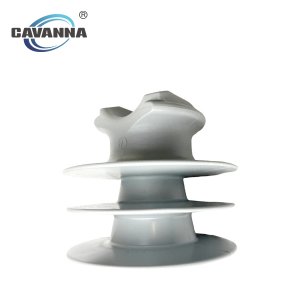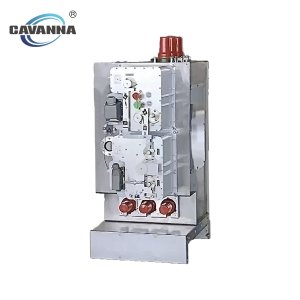
Description
As an alternative to ceramics, composite materials were developed for use in insulators for transmission systems. Such composite insulators are also referred to as non-ceramic insulators (NCI) or polymer insulators, and usually employ insulator housings made of materials such as ethylene propylene rubber (EPR), polytetro fluoro ethylene (PTFE), silicone rubber, or other similar materials.
Compared with the conventional insulators manufactured homogeneously from the material ceramic or glass, composite insulators consist of two components of different materials.
A number of composite insulators made from lighter weight polymeric materials have been developed for use in such high voltage installations. Such composite insulators generally include a fiberglass rod having a number of weather sheds constructed of a highly insulating polymeric material attached to the rod along its length. Composite insulators including shield layers of a synthetic material are given preference mainly because the shield layer of a synthetic material, particularly silicone, is hydrophobic, i.e. the insulators employed mostly outdoors are highly water repellant which is conducive to repelling dirt and thus to low leakage current losses. And also, this is a lightweight structure which facilitates assembly.
Composite polymer insulator is composed of epoxy glass fiber core rod, silicon rubber shed and metal parts.
Composite polymer insulator is of high strength and light weight. A synthetic insulator is 1/5 of that of porcelain insulator, but the circum-tensile strength of insulator is very high. Generally, it can be above 6000MPa.
Its umbrella shed is an organic polymer structure of silicone rubber. Therefore, it has a strong anti-pollution performance.
The product has reliable structure and will not damage the core rod. It belongs to the rod-shaped insulation structure.
Application
As an alternative to ceramics, composite materials were developed for use in insulators for transmission systems. Such composite insulators are also referred to as non-ceramic insulators (NCI) or polymer insulators, and usually employ insulator housings made of materials such as ethylene propylene rubber (EPR), polytetro fluoro ethylene (PTFE), silicone rubber, or other similar materials.
Compared with the conventional insulators manufactured homogeneously from the material ceramic or glass, composite insulators consist of two components of different materials.
A number of composite insulators made from lighter weight polymeric materials have been developed for use in such high voltage installations. Such composite insulators generally include a fiberglass rod having a number of weather sheds constructed of a highly insulating polymeric material attached to the rod along its length. Composite insulators including shield layers of a synthetic material are given preference mainly because the shield layer of a synthetic material, particularly silicone, is hydrophobic, i.e. the insulators employed mostly outdoors are highly water repellant which is conducive to repelling dirt and thus to low leakage current losses. And also, this is a lightweight structure which facilitates assembly.
Application Conditions
1. Ambient temperature: -40°C to +40°C
2. Altitude: no higher than 1500 meters
3. AC power frequency: ≤100Hz
4. Wind speed: ≤ 35 m/s
5. Earthquake intensity: ≤8
Specifications
Main dimension & technical data of Composite suspension insulator:
| Type | Rated voltage (KV) | Specified mechanical load | Section length (mm) | Min Arc distance (mm) | Leakage distance (mm) | Lightning impulse withstand BIL (KV) | Power frequency withstand (wet) (KV) |
| FXBW-66/70 | 66 | 70 | 895 | 700 | 2200 | 410 | 185 |
| FXBW-66/90 | 66 | 90 | 975 | 755 | 2195 | 350 | 160 |
| FXBW-66/120 | 66 | 120 | 975 | 755 | 2195 | 350 | 160 |
| FXBW-66/70 | 66 | 70 | 925 | 755 | 2779 | 410 | 185 |
| FXBW-66/120 | 66 | 120 | 1165 | 945 | 3140 | 410 | 185 |
| FXBW-110/100 | 110 | 100 | 1205 | 1000 | 3450 | 550 | 230 |
| FXBW-132/100 | 132 | 100 | 1340 | 1140 | 3630 | 650 | 275 |
| FXBW-138/100 | 138 | 100 | 1380 | 1140 | 3630 | 650 | 275 |
| FXBW-220/100 | 220 | 100 | 2400 | 2199 | 7150 | 1000 | 395 |
| FXBW-220/120 | 220 | 120 | 2460 | 2259 | 7400 | 1000 | 395 |
| FXBW-230/120 | 230 | 120 | 2482 | 2277 | 8080 | 1000 | 395 |
| FXBW-230/210 | 230 | 210 | 2720 | 2495 | 8350 | 1000 | 395 |
| FXBW-230/120 | 230 | 120 | 2044 | 1834 | 6470 | 1000 | 395 |





